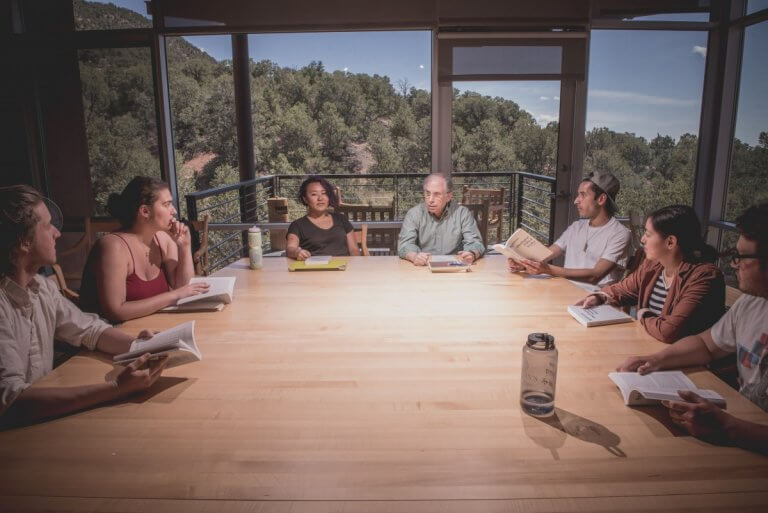
At what college do students read and discuss the largest, most exciting list of books in human history?
You may already have seen our exploration of the American university that takes an unconventional approach to education. In our piece, we discussed the depth and breadth of the academic experience at the private liberal arts institution St John’s College, also shedding light on its new and innovative funding model.
Now we take a deep dive into the university’s famous reading list, uncovering what a St. John’s education truly entails (and its far-reaching effects).
The defining characteristics of a St. John’s education lie in its expansive reading list and seminar. Over the course of four years, students read seminal texts that make up the Western Canon and discuss the structures, themes and ideas in seminar classes.
In their first-year, students start by reading the great classic Ancient Greek texts from Homer’s epic poems the Iliad and Odyssey, the dramas of Aeschylus, Sophocles and Euripides; and many foundational works of philosophy – including Plato’s Republic and Aristotle’s Poetics.

St John’s College
These texts establish the groundwork and base level of understanding for the years of study that follow, establishing habits of serious reading, inquiry and considered conversation through seminar. They also show that humans have always been wrestling with important, fundamental questions.
In second year the reading list broadens in scope, following the timeline to the great Roman texts, more epic poetry in the form of Virgil’s Aeneid, history in Tacitus’ Annals; geometry in Apollonius’ Conics; mathematics and astronomy in Ptolemy’s Almagest, and moving into the greats of the Renaissance, culminating with Shakespeare.
Spanning the curriculum’s longest chronological period, students read texts from the ancient biblical world to the dawning of early modernity, including the Hebrew Bible and the New Testament.
Junior year draws from a much smaller chronological period, principally the 17th, 18th and early 19th centuries, exploring modern philosophy; Descartes’ Meditations and Hobbes’ Leviathan, as well as 17th century epic poetry in Milton’s Paradise Lost.

St John’s College
Not to mention archetypal works of fiction such as Cervantes’ Don Quixote – the most influential work of literature from the Spanish Golden Age, and Elliot’s 19th century realist novel Middlemarch.
Senior year texts explore founding texts of American Democracy, including ‘Selected Speeches’ by Lincoln; the most significant text in natural history, Darwin’s On the Origin of the Species; Tolstoy’s War and Peace; and the late modern philosophes of Marx, Kierkegaard and Nietzsche.
The books read at St. John’s include classic works in philosophy, literature, political science, psychology, history, religion, economics, math, chemistry, physics, biology, astronomy, music, language, and more; all of which are discussed during seminar.
Unlike most colleges, there are no lectures at St. John’s. Instead, all the classes are seminars built around discussing the reading list. Meeting on Monday and Thursday evenings, seminars are made up of fewer than 20 students with two tutors.
Seminars require substantial reading prior to class to ensure conversation is rich and thought-provoking. The two tutors make for some of the most intimate faculty-student connections of any American college. They ensure diverse approaches to the texts are considered.
Students from all walks of life are welcome at St. John’s, from the US and abroad. Over 20 percent of students are international. This ensures topics are considered from many angles; there’s always consideration for a range of views which makes for debates that are globally-aware and tackle the texts from new angles.
The inclusive nature of St. John’s makes for an environment of civil discourse, every student’s voice is heard and open for debate, encouraging freedom of expression, critical thinking, introspection and discussion.

St John’s College
In the four-year course at St. John’s, seminar is the central occasion for the reading and sustained discussion of these great books.
Far-ranging conversation allows for students to powerfully engage with reading list texts and consider the vital questions they raise for us as human beings.
Students learn from great heroes falling from grace; epic mythological voyages; deals with the devil, Spanish chivalry; the earliest geometric ideas; Ancient understanding of the stars; and 19th century medicine.
An immersive education in the texts that have shaped the world, characterised by fresh discussion and critical analysis from a cultural melting pot of students – what an opportunity!
From Rousseau to Wordsworth, Dante to Hawthorn; Johnnies are sure to be the most well-read guest at any dinner party, or most interesting applicant for the job.
In their final year students write a Senior Essay – the culmination of four years of study. Bolstered by an unparalleled wealth of intertextual knowledge, students choose the text they’d most like to explore. A faculty committee assesses their work.
But the real gift of a St. John’s education is not just in-depth knowledge of the world’s most influential texts, it’s being content with the knowledge that so much of the world is unknowable; a humility drawn from in-depth, critical study and inquiry-driven conversation.
Become a lifelong learner, critical thinker and articulate orator at St John’s.
Follow St. John’s College on Facebook, Twitter and YouTube
Liked this? Then you’ll love…
St. John’s College: Going against the grain
Experience an unforgettable study adventure in Santa Fe







